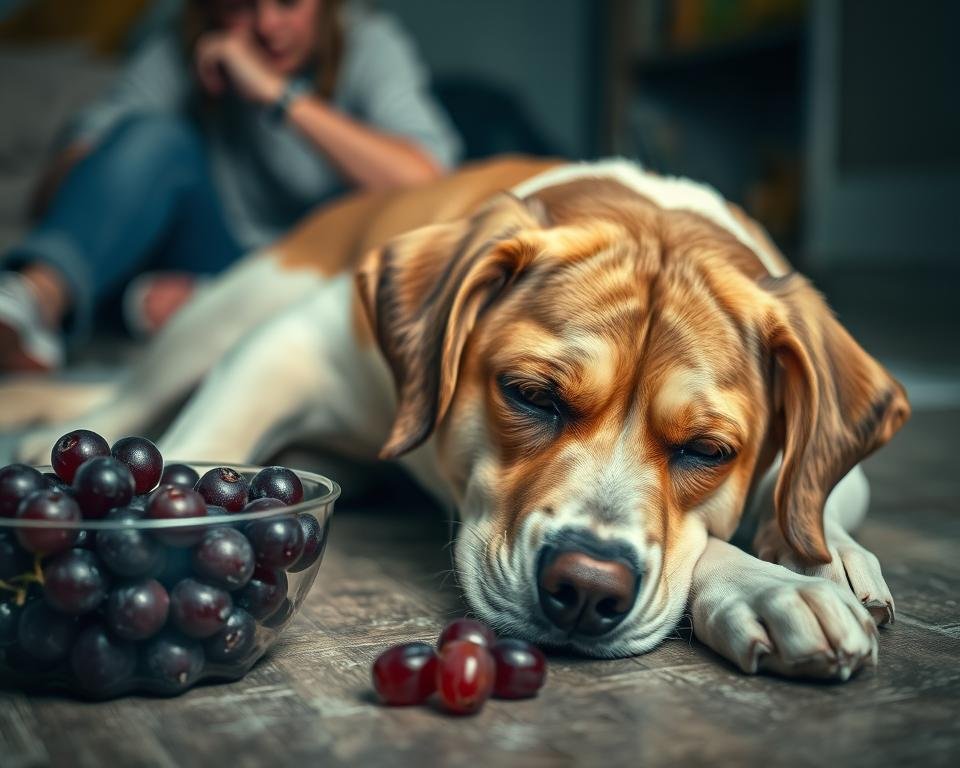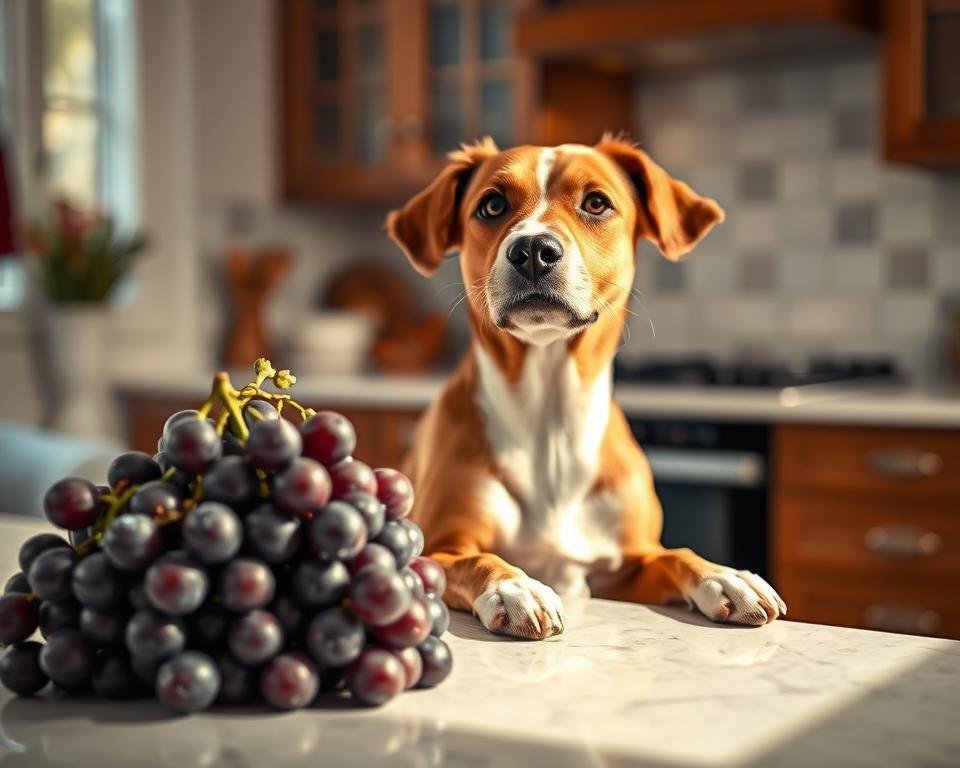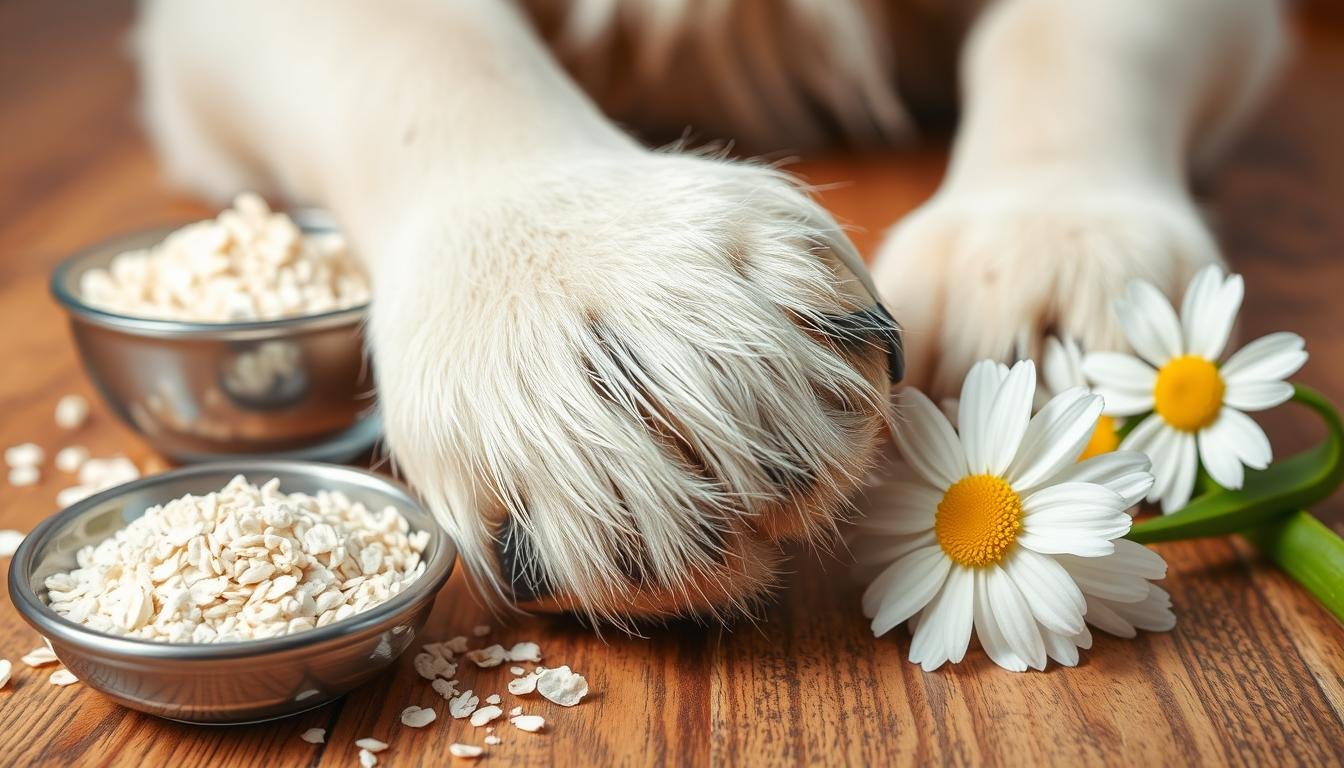Many pet owners wonder if dogs can eat grapes. But the answer is a clear no. Grapes and raisins are harmful to dogs, no matter their age, breed, or size. It’s important for dog owners to know why dogs can’t eat grapes.
Research shows that even one grape or raisin can cause kidney failure in dogs. This can lead to sudden death. There’s no safe amount of grapes for dogs, so it’s best to keep them away.
Dogs can’t break down certain substances in grapes, like tannins and flavonoids. These increase the risk of grape toxicity. Even a small amount can cause severe symptoms. So, grapes are definitely bad for dogs.
If you think your dog ate grapes, act fast. They can face serious health problems right away.
Understanding Grape Toxicity in Dogs
Grape toxicity in dogs is a serious issue for pet owners. The exact reason grapes harm dogs is unknown. But studies link grape eating to acute kidney failure in dogs.
Dogs can’t break down certain grape compounds. This can cause severe health problems.
What Makes Grapes Harmful?
The main worry is grape damage to a dog’s kidneys. Researchers think tannins, flavonoids, and monosaccharides in grapes are to blame. It’s key for dog owners to know which grapes are toxic.
All grape types, whether red, green, organic, or commercial, are risky for pets.
Types of Grapes and Their Risks
All grape types can be harmful. It’s not just fresh grapes that are a problem. Grape products like raisins, juice, and jellies are also dangerous.
Items with raisins, like raisin bread or cinnamon raisin bagels, are very risky. It’s essential to avoid giving any such products to your dog.

If a dog eats grapes or raisins, act fast. The ASPCA Animal Poison Control Center can help. Quick action can make a big difference if your dog has eaten grape products.
Can Dogs Eat Grapes: Confirming the Negative Impact
Grapes and raisins can be very dangerous for dogs. Many dog owners don’t know how risky these fruits are. Grapes and raisins can cause serious kidney problems, even in small amounts. This shows how important it is to watch out for our pets.
Grapes and Raisins: The Hidden Dangers
Studies show that grapes and raisins are bad for dogs. Over 23% of vets are very worried if dogs eat grapes. They say dogs should never eat grapes because it can damage their kidneys.
Symptoms can start in 24 to 72 hours. They can range from stomach problems to feeling very tired. Vets often watch dogs closely if they think they ate grapes.
The Myth of Safe Consumption
Many people think it’s okay to give dogs grapes in small amounts. But, there’s no safe amount of grapes for dogs. About 51% of vets are worried if dogs eat grapes or raisins.
It’s very important to know the risks. Even if a vet is not very worried, it’s better to be safe. Thinking one grape won’t hurt is not true. Grapes can really harm dogs.
Symptoms of Grape Poisoning in Dogs
Every dog owner needs to know the signs of grape poisoning. Spotting the early signs of grape toxicity can save your dog’s health. Symptoms show up within hours of eating grapes and can vary in each dog.
Early Warning Signs
The first signs usually appear 12 to 24 hours after a dog eats grapes or raisins. Look out for:
- Vomiting
- Loss of appetite
- Lethargy
- Diarrhea
Spotting these early signs is key. Quick action can stop things from getting worse.
Severe Symptoms of Kidney Failure
Untreated, grape poisoning can lead to kidney failure in dogs. This can happen 24 to 48 hours after eating grapes. Signs of kidney failure include:
- Abdominal pain
- Increased thirst and urination
- Cessation of urination
- Nausea and vomiting
- Uremic breath
- Diarrhea
Seek vet help right away if kidney failure happens.
When to Seek Veterinary Help
If your dog shows signs of grape poisoning, call your vet fast. Quick action can help manage the problem. Remember, there’s no antidote for grape toxicity, so acting fast is essential.

What to Do If Your Dog Eats Grapes
If your dog eats grapes, act fast to keep them safe. The first steps are key to their recovery. If you think your dog ate grapes, call a vet right away for help.
Immediate Actions to Take
After grapes are eaten, take these steps to lower health risks:
- Stay calm and assess the situation.
- Determine the quantity and type of grapes consumed.
- Call your veterinarian or a pet poison helpline for tailored veterinary advice for grape ingestion.
Some vets might suggest using hydrogen peroxide to make your dog vomit. But only do this if your vet says it’s okay and your dog isn’t showing signs of distress.
Veterinary Treatment Options
There are treatments if symptoms show up:
- Inducing vomiting to prevent further toxin absorption.
- Administering activated charcoal to bind the toxins.
- Providing intravenous fluids to support kidney function and maintain hydration.
In serious cases, your dog might need to stay in the hospital. Getting help quickly is very important for their recovery. This shows how urgent it is to see a vet if your dog eats grapes.
Preventing Grape Poisoning in Your Pet
Keeping dogs safe from grapes is key. Dog owners need to take steps to avoid grape toxicity. By following safe practices, you can keep your dog away from grapes and raisins.
Safe Practices for Dog Owners
One important step is to keep grapes and raisins out of reach. Here are some tips:
- Store grapes and raisins in high cabinets or sealed containers that dogs cannot access.
- Educate family members about the importance of not sharing grapes with dogs.
- Be cautious when cooking or baking with grape ingredients to prevent accidental ingestion.
- Always supervise children around pets to avoid unintentional feeding of grapes or products containing grapes.
Awareness for Friends and Family
Telling your friends and family about grape dangers is important. Share this info at gatherings or on social media. Knowing the risks can save lives, as even a small amount can cause serious health problems.
For more tips and info on grape poisoning, check out this resource. Educating others and being proactive can greatly reduce risks. This ensures a safer environment for your pet.
Conclusion
Dogs should avoid grapes and raisins because they are toxic. These fruits can cause serious health problems like kidney failure and vomiting. It’s important for dog owners to keep their pets away from these fruits to keep them healthy.
If your dog eats grapes or raisins, act fast. Try to make them vomit within 4 to 6 hours. This can save their life. Also, get them to the vet right away. They might need to stay in the hospital for up to 48 hours.
There are many safe fruits for dogs, like apples and blueberries. Knowing about grape toxicity can help keep your dog safe. By staying informed and teaching others, we can make a safer world for dogs. For more healthy snack ideas, check out this link.
FAQ
Can dogs have grapes at all?
No, dogs should not eat grapes or raisins. They are very toxic and can cause serious health problems, like kidney failure.
Why can’t dogs eat grapes?
Grapes have compounds that are harmful to dogs. They can cause kidney damage. The exact harmful substance is not known, and there’s no safe amount for dogs.
Are grapes bad for dogs?
Yes, grapes are very dangerous for dogs. Eating them can lead to severe kidney problems and even death.
What should I do if my dog ate grapes?
If your dog eats grapes or raisins, call your vet right away. Quick action is very important.
Are raisins toxic to dogs?
Yes, raisins are toxic to dogs because they are dried grapes. Eating either can harm a dog’s health seriously.
What are the early symptoms of grape poisoning?
Early signs include vomiting, diarrhea, loss of appetite, and feeling very tired. These symptoms can start within 12 to 24 hours after eating grapes.
When should I seek veterinary help for my dog?
Get veterinary help right away if your dog shows symptoms after eating grapes or raisins. Waiting can make things worse.
How can I prevent grape poisoning in my dog?
Keep grapes, raisins, and grape products away from your dog. Also, teach family and friends about the dangers of these foods.
What veterinary treatment options are available for dogs that eat grapes?
Treatment might include making your dog vomit, giving activated charcoal, and IV fluids. These help support the kidneys.



